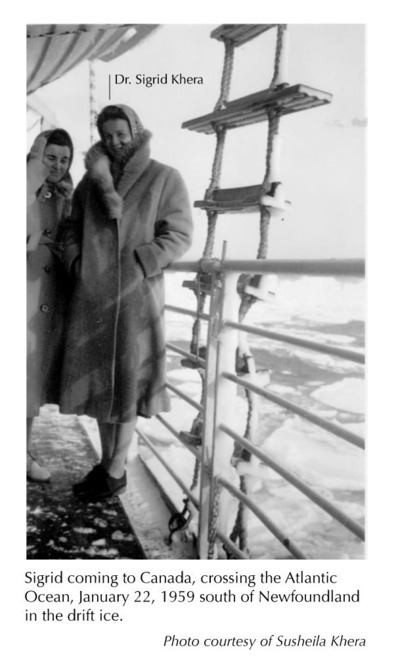Here at the Fort McDowell Yavapai cemetery in Arizona, as requested by her Yavapai friends, is the resting place of Dr. Sigrid Khera. The sentiment on this grave marker are the words spoken by Minnie Williams of Fort McDowell who said at the time of Sigrid’s passing, “She was more than a friend.”
In addition to being the mother of three children, Sigrid was an anthropologist who contributed many papers in her chosen field. She furthered the understanding of the Fort McDowell Yavapai tribe through extensive research and documentation. Her lengthy work with tribal elders Mike Harrison and John Williams led to the eventual publication of the 2012 book, ORAL HISTORY OF THE YAVAPAI. Please visit the book’s website at the following address: www.oralhistoryoftheyavapai.com
Twenty-eight days after Sigrid passed away in Fairbanks, Alaska, a memorial service for her was held at the Fort McDowell Yavapai Reservation at the Arbor, on Saturday, August 25, 1984. This rare honor was noted that day in The Arizona Republic. At the service, John Smith said the opening and closing prayers. Carolina Butler, Dixie Lee Davis, Patricia Mariella, and Hiawatha Hood, all gave tributes. Kimberley Williams sang a Yavapai song. Christina Butler, age 10, read a letter she had received from Sigrid shortly before she died. A poem that Dixie had composed for Sigrid was read. A young Yavapai man spoke. At the end, John Smith gave a stirring message to his people at Fort McDowell to always save their land. The memorial service was recorded and years later in 2010, in anticipation of ORAL HISTORY OF THE YAVAPAI, Carolina gave CD copies to many Yavapais at the Fort McDowell, Camp Verde and Prescott reservations so that all would know about Sigrid Khera and her work with Yavapai elders Mike Harrison and John Williams.
Sigrid was born Sigrid Bechmann in 1934 in Vienna, Austria, where she grew up and received her education. She had one brother, Guenther Bechmann.
Sigrid earned her Ph.D. in anthropology at the University of Vienna in 1958. In January 1959 she sailed across the Atlantic Ocean (see associated photo) to Canada where she met and married Dr. Paul Khera. From Canada, the Kheras moved to the eastern United States. The couple had three children, Susheila, Paul and Otto.
In January 1974 the family moved to Arizona where Sigrid found work as an assistant professor of anthropology at Arizona State University, Tempe. One month later, an unusual letter arrived at Sigrid’s desk. The letter was from Carolina Butler, a Mexican-American resident of nearby Scottsdale, who said she was looking for a professional to work with her friend who was a Yavapai elder.
Mike Harrison, the oldest man in the Fort McDowell Yavapai tribe, had asked Carolina to write the tribe’s history from the tribal perspective. At the time, Carolina was already working with the tribe as an activist, helping them to save their land and stop their relocation as a result of the Bureau of Reclamation’s plans to construct a large dam which would flood the tiny reservation. The United States government envisioned Orme Dam at the confluence of the Salt and Verde rivers, where it would become part of the most expensive water project in U.S. history, the Central Arizona Project. Ultimately, in 1981, the tribe prevailed and Orme Dam was defeated, saving the reservation..
Responding to Carolina’s letter, Sigrid contacted Carolina who took her to Fort McDowell and very quickly in March 1974, Sigrid started working with Mike Harrison and John Williams to record their telling of Yavapai history. This work continued for two years until Mike became too ill and ended his sessions in the summer of 1976. Sigrid continued working with John and others at Fort McDowell while making many friends. In late October 1976 Sigrid met Jim White, a Cocopah healer and longtime friend of John and Minnie Williams and others. Jim had been taught by the great Yavapai medicine man Mike Nelson. In 1977 Jim White came to Fort McDowell five times for lengthy visits and Sigrid recorded John and Jim singing Yavapai songs. Jim White died in January 1978 at age 75.
In late 1978 Sigrid left Arizona to work at the University of North Dakota in anthropology. In 1980 Sigrid moved again to work at the University of Alaska, Fairbanks, as associate professor of anthropology. Sigrid would return to Arizona during Christmas school breaks and stay with her friend Carolina in Scottsdale, taking time to renew her friendships with the Yavapai at Fort McDowell.
Mike and John both died in 1983 at ages 97 and 79, respectively. Sadly, Sigrid died the following year as a result of cancer at the early age of 49.
In Vienna, Sigrid had always dreamed of coming to America to do anthropology research. But it was her work with the Fort McDowell Yavapai in Arizona that Sigrid said was the fulfillment of her life. Days before she died in Fairbanks on July 28, 1984, Sigrid said, “My heart is there in Arizona.”
In late 2012 Carolina published Sigrid Khera’s work with Mike Harrison and John Williams in the book “ORAL HISTORY OF THE YAVAPAI.” It has been highly acclaimed. From the beginning, their work has been recognized as rare primary source material which will stand indefinitely. The book is published by the University of Arizona Press in Tucson (www.uapress.arizona.edu).
Sigrid Khera’s three children, Susheila, Paul, Otto, paid for her grave marker and were assisted by Carolina Butler and Yavapai friends.


